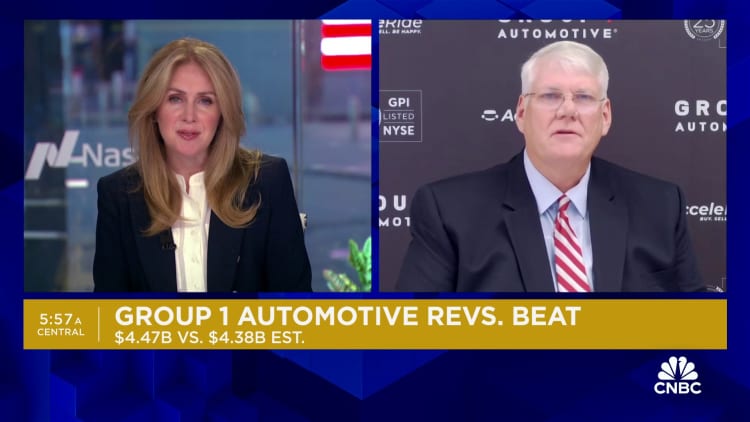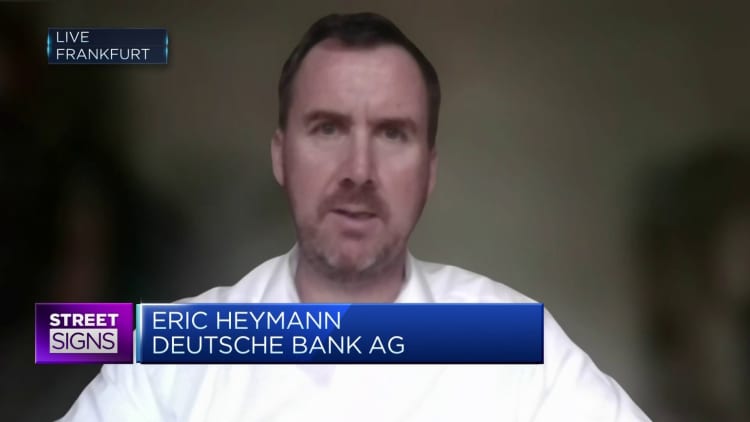
New energy vehicles for export at Lianyungang Port, Jiangsu Province, China, on April 25, 2024.
Nurphoto | Nurphoto | Getty Images
Electric vehicle sales have risen sharply this year, led by growth in China and a strong demand for hybrid vehicles in particular, according to a report from Counterpoint Research.
The report, released Monday, showed that sales of EV units globally, including fully battery-powered vehicles (BEVs) and hybrids, were up 18% in the first three months of 2024 compared with the same period last year.
Sales of hybrid vehicles, which have both electric motors and combustion engines, vastly outpaced those of full battery-powered alternatives, rising 46% year over year. BEV sales rose 7%.
“The cheaper upfront cost of [hybrids] when compared to [battery EVs] and the availability of a fuel tank that eliminates range anxiety were among the main reasons for high [hybrid] demand,” Counterpoint research analyst Abhik Mukherjee said in the report.
The data follows recent reports that suggest hybrid adoption is now outpacing that of fully electric vehicles amid concerns about weak resale values of the former and the possibility of current BEV technology becoming obsolete soon.
“Buying mid-priced [hybrids] is a more logical choice for consumers since their prices are comparable to or lower than most of [battery electric vehicles],” the report said.
China extends lead
Chinese companies have been a huge beneficiary of the rise in demand for electric vehicles, especially firms that sell both BEVs as well as hybrids.
According to Counterpoint, EV sales in China jumped 28% in the first quarter of 2023, amid an ongoing price war that has pushed down costs for consumers.
The country’s largest EV maker, BYD, saw sales of hybrid vehicles increase by 7% in the first three months of this year, accounting for nearly one-third of the global hybrid market, followed by Geely Holdings and Li Auto.
Sales of EVs in the United States were second highest globally, followed by Europe. But, while overall EV sales in the U.S. rose 2%, those of battery electric vehicles declined by 3% in the quarter.
Tesla, the leading U.S. EV maker, which only produces BEVs, saw a 9% year-on-year decline in sales in the first quarter. It was still in the top position globally in BEV sales in Q1 2024, commanding a 19% market share. BYD and Volkswagen had a 15% and 6% share, respectively.
Among the top three BEV makers only BYD recorded growth, with sales jumping 13%, while Tesla and Volkswagen’s sales declined 9% and 4% respectively, the report said.

BYD’s strong performance comes as the company aggressively expands globally. According to the report, the company exported almost 100,000 EVs last quarter, a 152% year-on-year growth, driven primarily by shipments to Southeast Asia.
Liz Lee, associate director at Counterpoint, said BYD’s remarkable exports highlight the growing global demand for EVs, including hybrids, with the market “poised for significant growth.”
“[Y]et signs of a slowdown also loom and the annual growth may dip below 20%,” she added, noting that companies such as Tesla face declining interest in BEVs.
A Gallup poll in April found that less than half of U.S. adults — 44% — said they were seriously considering or might consider buying an EV, down from 55% in 2023. Meanwhile, the proportion of those not looking to buy an EV rose to 48% from 41%.
Other headwinds to the market could include an increase in protectionist measures in 2024, with both the EU and the U.S. reportedly set to enforce new tariffs on EV imports from China.












